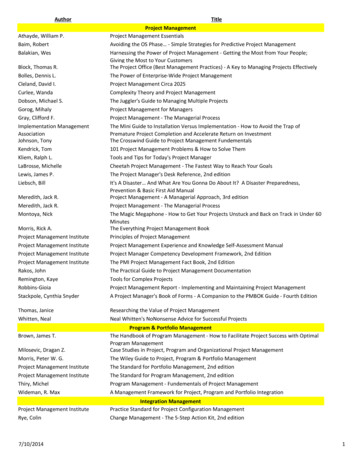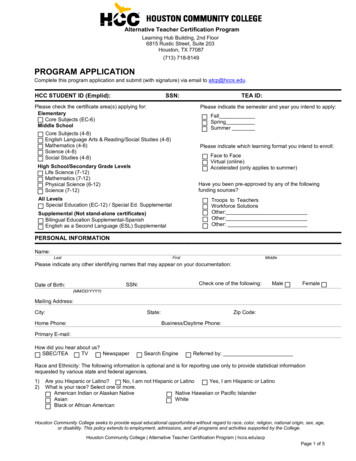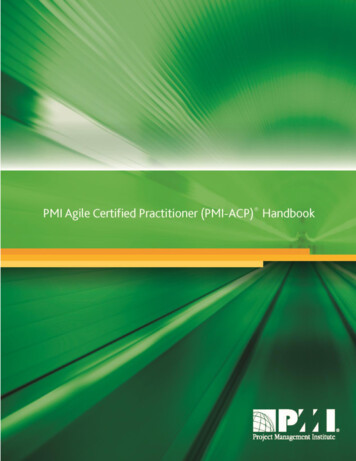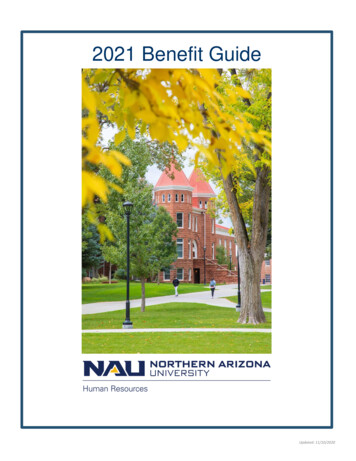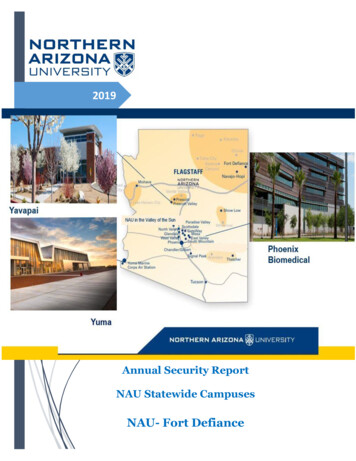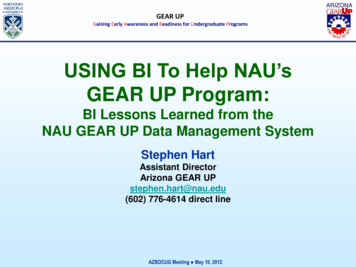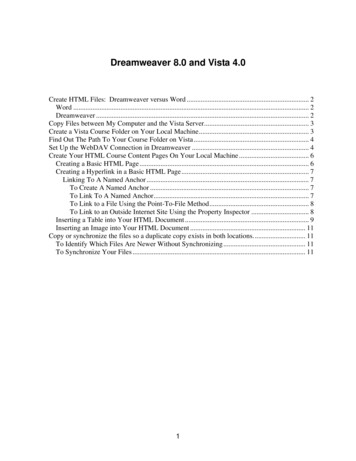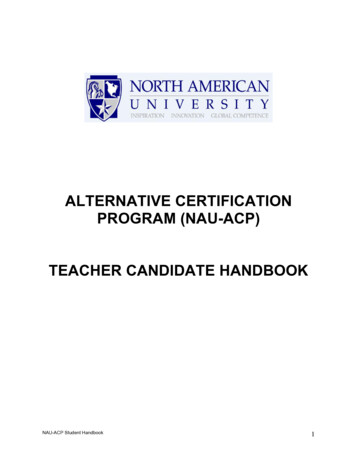
Transcription
ALTERNATIVE CERTIFICATIONPROGRAM (NAU-ACP)TEACHER CANDIDATE HANDBOOKNAU-ACP Student Handbook1
TABLE OF CONTENTSTABLE OF CONTENTS . 2AN ALTERNATIVE ROUTE . 3LOCATION . Error! Bookmark not defined.CONTACT INFORMATION . Error! Bookmark not defined.NORTH AMERICAN UNIVERSITY . Error! Bookmark not defined.STEPS TO TEACHER CERTIFICATION . 4PURPOSE AND NEED STATEMENT . 4CORE VALUES . 5ADVISORY COMMITTEE DESCRIPTION AND INVOLVEMENT . Error! Bookmark not defined.IMPORTANT DATES/DEADLINES. 5CERTIFICATE AREAS OFFERED . 6ADMISSION TO ACP EDUCATOR CERTIFICATION PROGRAM . 7ADMISSION CRITERIA . 7NONDISCRIMINATION POLICY . 12ADMISSION PROCEDURES . 12LATE HIRES. 13TRANSFERS . 13COMPLIANCE WITH FERPA . 14PROGRAM FEES . 14REFUND POLICY . 14PROBATIONARY CERTIFICATION . 14COMPLETING ACP EDUCATOR CERTIFICATION PROGRAM . 16CURRICULUM . 16COURSE DESCRIPTIONS . 16PROGRAM DELIVERY and ATTENDANCE REQUIREMENTS . 18ACADEMIC HONESTY . 19TXBESS (TEXAS BEGINNING EDUCATOR SUPPORT SYSTEM). 19ONGOING RELEVANT SUPPORT for DIVERSE SETTINGS. 20INTERNSHIP/ TEACHER PRACTICUM . 20DRESS CODE DURING INTERNSHIP AND FACE-TO-FACE MEETINGS . 21PORTFOLIOS as INSTRUMENTS for SELF-REFLECTION . 22EXITING THE PROGRAM / GRADUATION . 22PROGRAM WITHDRAWALS . 22TESTING . 23TExES EXAMS . 23READINESS TO TAKE TExES EXAMS . 23STATE CERTIFICATION . 24APPLYING for STANDARD CERTIFICATION . 24FINGERPRINT REQUIREMENT . 24ADDING NEW CERTIFICATION AREAS . 25APPENDICES . 26APPENDIX - I . 27APPENDIX II . 33APPENDIX III. 34APPENDIX IV . 36APPENDIX V . 37GLOSSARY/COMMON TERMS . 42NAU-ACP Student Handbook2
AN ALTERNATIVE ROUTELOCATIONNorth American University-Alternative Certification Program is currently located at 11929 WAirport Blvd., Stafford, TX 77477. It serves students and public in North American Universitycampus.CONTACT INFORMATIONAlternative Certification Program (NAU-ACP)AddressContact PersonPhoneFaxE-mailWeb Site: 11929 W Airport Blvd., Stafford, TX 77477: Halil I. Tas, Program Director: 832-230-5545: 832-230-5546: halil@na.edu: www.na.edu/acpNORTH AMERICAN UNIVERSITYNorth American University (NAU) is a private non-profit 501(c)(3) organization established inHouston, TX with main purpose of establishing a private not-for-profit higher educationinstitution. As an institution of higher learning, NAU is committed to providing a nurturingenvironment for the systematic pursuit of academic and career-related learning, professionaland personal development, responsible citizenship, and global cultural competency. Theuniversity aims to achieve these goals through instruction, scholarly inquiry, the free discussionand dissemination of ideas, and creative activity. NAU is currently offering Bachelor degreeprograms in Business Administration, Computer Science, and Interdisciplinary Studies andEducation, and Master Degree programs in Education.NAU-ACP Student Handbook3
STEPS TO TEACHER CERTIFICATION!!!!!!!!Apply to NAU-ACPComplete admission requirementsMeet content area requirementTake online module coursesSeek employment to complete internshipSubmit portfolioTake PPR and subject testFile for certification with the statePURPOSE AND NEED STATEMENTThe main purpose of NAU-ACP is to help meet the need for certified teachers in the state ofTexas. NAU-ACP aims to certify candidates in Mathematics (4-8), Technology Applications (EC12), Physical Science (8-12), Social Studies (4-8), English Language Arts and Reading (4-8),and Science (4-8). Texas Higher Education Coordinating Board published a report in 2000entitled “Closing the Gaps in Higher Education”. According to the report, increasing the numberof math and science certified teachers is one of the top priority goals of Texas higher education,and the number needs to be increased from less than 1,000 to 3,000 by 2015 through highereducation programs. In 2005, the report was revised and the target number of math and scienceteachers to be certified through all teacher certification routes was increased to 6,500. Thisnumber may be increased further due to the high number of certified math and science teachersfrom the baby-boomer generation who are expected to retire in the coming years.Toward these goals, NAU-ACP emphasizes the certification of practicing but uncertifiedteachers in publicly funded charter schools and work to recruit new candidates with bachelor’sdegrees in math, science and related disciplines into the teacher workforce.NAU-ACP curriculum modules are delivered through an online learning system, allowingcandidates from around the state to participate. ACP teacher candidates reside in major cities ofTexas, including Houston, Dallas, Austin, San Antonio, El Paso, Lubbock, Brownsville, andLaredo. Field supervisors provide face-to-face mentoring in these locations where thecandidates undertake their internship, maintaining the accessibility of the program forcandidates from around the state.NAU-ACP Student Handbook4
CORE VALUESThe following core values are identified to guide all personnel of the program as they strive toachieve the program goals.Professional Excellence – Commitment to the professional development of candidates asteachers possessing depth and breadth of knowledge and skills.Learning – Dedication to the discovery, construction, discussion and dissemination ofknowledge.Honesty and Integrity – Commitment to truth and consistency in one’s actions andcommunication.Teamwork – Pursuit of excellence through consultation and collaboration.Ethical and Professional Conduct – Pursuit of high ethical and professional standards in everyendeavor.ADVISORY COMMITTEE DESCRIPTION ANDINVOLVEMENTThe responsibilities of the Advisory Committee include, but are not limited to, providing a forumfor discussion of concerns about the program and making suggestions for improvement. Theprogram director apprises the Advisory Committee of current program statistics, improvementefforts, and potential changes or initiatives. The Advisory Committee will hear results of internal and external evaluations of the program.Suggestions for program improvement are solicited from committee members as a result. The Advisory Committee makes suggestions for program modifications. In addition, thecommittee members are made aware of program modifications implemented in order tomaintain compliance with TEA rules, to operate more efficiently, or to increase the level ofknowledge and skills of candidates. The Advisory Committee meets at least twice a year.The advisory committee of the ACP consists of three or more representatives from the followingcategories of stakeholders: Public schools, institutions of higher education, business world, andthe community. The advisory committee meets twice a year. An agenda is circulated prior to themeeting and the committee members provide their input to the agenda. During the meeting, thedirector brings each of the agenda items up for discussion and the comments made bycommittee members are recorded by a scribe. The management communicates the committeeviews on major policy decisions to the governing board and unless there is a legal or strategicreason, follows the recommendation of the advisory committee.Possible items to be discussed: The method of delivery for instruction modules, facility needsand improvement, the fee for the program, and major policy issues including admission,internship, staffing and financial plan, areas where certification program is offered, modules toNAU-ACP Student Handbook5
be offered in the curriculum, and the curriculum content. The advisory committee is involved inthe evaluation of the program. Committee members, including a public school teacher who wentthrough the process of alternative certification and a public school administrator are involved inthe program design and revision on an ongoing basis.Four categories of stakeholders are represented in the advisory committee: Public schools,higher education, business and community.IMPORTANT DATES/DEADLINESCandidates should submit their application to the ACP office at least ten business days prior tothe first day of trainingCERTIFICATE AREAS OFFEREDNAU-ACP offers alternative certification in the following areas. Mathematics -grades 4 through 8Science - grades 4 through 8Technology Applications – grades EC through 12Physical Science – grades 8 through 12Social Studies – grades 4 through 8English Language Arts and Reading – grades 4 through 8NAU-ACP Student Handbook6
ADMISSION TO ACP EDUCATOR CERTIFICATIONPROGRAMADMISSION CRITERIACandidates applying for admission to ACP are required to meet the following criteria:1. Baccalaureate Degree: The applicant must have a baccalaureate degree earned fromand conferred by an institution of higher education that is recognized by one of theregional accrediting agencies. If the applicant earned the baccalaureate degree from aforeign university, the transcript must be evaluated by an accrediting organizationrecognized by the Texas Higher Education Coordinating Board to prove that it isequivalent to a U.S. baccalaureate degree.2. Minimum Grade Point Average (GPA): The candidate must submit an official transcriptmeet one of the following criteria in order to be eligible to enter the ACP:a. an overall GPA of at least 2.5 orb. a GPA of at least 2.5 in the last 60 semester credit hours; orc. demonstration of achievement equivalent to the academic achievementrepresented by GPA through the applicant’s work, business, or careerexperience as evidenced by the applicant. GPA requirement will be granted bythe program director only in extraordinary circumstances and will not be used toadmit more than 10% of any cohort of candidates.3. Content Coursework: The candidate must demonstrate the content mastery bymeeting one of the following:a. a minimum of 12 semester credit hours in the subject-specific content area forthe certification sought; orb. a passing score on Pre-Admission Content Test (PACT). The content test mustmatch the content area for the certification sought.4. Competency in Basic Skills: The candidate must demonstrate basic skills in reading,written communication, and mathematics or by passing the Texas Academic SkillsProgram (TASP) test or the Texas Higher Education Assessment (THEA) with aminimum score of 230 in reading, 230 in mathematics, and 220 in writing. In thealternative, a candidate may demonstrate basic skills by meeting the requirements of theTexas Success Initiative as follows:a. ACT: composite score of 23 or higher with a minimum of 19 on the English andthe mathematics sections;b. SAT: a combined critical reading (formerly "verbal") and mathematics score of1070 with a minimum of 500 on the critical reading and 500 on the mathematicstestNAU-ACP Student Handbook7
5. Oral Communication Skills: Proof of English language proficiency must be provided tothe ACP office before an applicant can be considered for admission to the program.English proficiency can be demonstrated in any one of the following ways:a. completion of an undergraduate or graduate degree at an institution of highereducation in the United States;b. if an undergraduate or graduate degree was earned at an institution of highereducation outside of the United States, evidence must be provided underprocedures approved by the executive director that the primary language ofinstruction was English;c. Minimum score of 26 on speaking portion of TOEFL test.6. Application Form: The candidate must submit a signed application form.7. Interview: An interview is required as part of the admission process to determine thecandidate's appropriateness for the certification sought.8. Other Requirements: Candidates applying for a Texas educator certificate must:a. be at least 18 years of age;b. not be disqualified or the subject of a pending proceeding under Chapter 249 ofTitle 19 of Texas Administrative Code.c. not be disqualified by federal law;d. be willing to support and defend the constitutions of the United States and Texas.In addition to the requirements listed under Admission Criteria, all applicants and candidatesshould be aware of the followings:1. Educators are required to possess the following skills:a. Cognitive Skills: Teacher Candidates must be able to understand subject matter andrelated skills, thought processes, and attitudes at a level and in a manner whichfacilitates organization and integration of information, and interpretation andevaluation of ideas. Teacher Candidates must be able to learn, understand, select,and use teaching strategies appropriate to the level, ability, and interests of thestudents in the class.b. Communicative Abilities: Teacher Candidates must be able to communicateeffectively with students, teachers, aides, principals, parents, and others as needed.They must be able to speak with appropriate volume, vocabulary, and expression inthe language of instruction so as to be readily understood by and set a goodexample for students. Teacher Candidates must be able to complete, in a timelymanner, written plans for teaching, student worksheets, assignments, tests, studentassessments and referrals, reports on student progress, communications to parents,and a variety of documents such as timetables, attendance records, and marksrecords.c. Sensory/Motor Abilities: Teacher Candidates must possess sufficient sensoryfunction to develop and maintain awareness of all students in the classroom, andsufficient motor function to move about the classroom, manage materials andsupplies, and demonstrate and supervise classroom activities.NAU-ACP Student Handbook8
d. Emotional/Social/Interactional Abilities: Teacher Candidates must demonstrate theemotional stability required for full utilization of intellectual abilities and judgment;must be able to “read” and understand different social situations, and communicateeffectively in social interactions. Teacher Candidates must be able to develop rapportwith students and appropriate relationships with others in schools, and must be ableto demonstrate flexibility and adaptability in the face of the uncertainties inherent inthe functioning of schools and classrooms. Compassion, integrity, concern for others,interpersonal skills, and motivation are expected of teachers and of TeacherCandidates.2. Educators are required to accept the following responsibilities:a. Facilitate Learning: The primary responsibility of any teacher is to teach, and to do sowith excellence. Not only do teacher candidates need to know the subject area well,but they must have the ability to transfer what they know to a classroom of diversestudents.b. Be a Role Model: Educators are expected to be able to demonstrate how topeacefully resolve conflict, show how to dress appropriately and teach how tocommunicate clearly. They are also expected to be able to demonstrate integrity,kindness, compassion and other qualitiesc. Enforce Rules: All students deserve a safe environment that is conducive to learning,and the teachers have a responsibility to provide such environments. Teachers mustbe consistent so that students feel secure and know what to expect. Personalinformation about the students and their families should be kept confidential.d. Lifelong Learning: Teachers are never finished preparing to become a teacher. Theteachers who make a difference are the people who stay on top of currenteducational research and continue to learn more about their content area.3. High expectations for students in TexasThe mission of the public education system of Texas is to ensure that all Texas childrenhave access to a quality education that enables them to achieve their potential and fullyparticipate now and in the future in the social, economic, and educational opportunities ofour state and nation. That mission is grounded on the conviction that a general diffusion ofknowledge is essential for the welfare of this state and for the preservation of the libertiesand rights of citizens. It is further grounded on the conviction that a successful publiceducation system is directly related to a strong, dedicated, and supportive family and thatparental involvement in the school is essential for the maximum educational achievement ofa child.The objectives of public education are:a. Parents will be full partners with educators in the education of their children.b. Students will be encouraged and challenged to meet their full educational potential.c. Through enhanced dropout prevention efforts, all students will remain in school untilthey obtain a high school diploma.d. A well-balanced and appropriate curriculum will be provided to all students.e. Educators will prepare students to be thoughtful, active citizens who have anappreciation for the basic values of our state and national heritage and who canunderstand and productively function in a free enterprise society.NAU-ACP Student Handbook9
f.Qualified and highly effective personnel will be recruited, developed, and retained.g. The state's students will demonstrate exemplary performance in comparison tonational and international standards.h. School campuses will maintain a safe and disciplined environment conducive tostudent learning.i.Educators will keep abreast of the development of creative and innovativetechniques in instruction and administration using those techniques as appropriate toimprove student learning.j.Technology will be implemented and used to increase the effectiveness of studentlearning, instructional management, staff development, and administration.Creating a classroom where high expectations permeate the culture is challenging. The keyis recognizing that “high expectations” is both a belief about student capability and specificactions undertaken to make those beliefs a reality. Teachers who demonstrate the highestexpectations show their students that they expect rigorous, challenging, high quality work.The following 10 strategies help create a culture of high expectations:1. Developing, communicating and implementing classroom motivation and managementplans in every classroom.2. Implementing instructional plans for bell-to-bell teaching.3. Organizing and arranging classrooms to spur productivity.4. Establishing high academic standards.5. Communicating expectations to students and their families.6. Actively engaging each student in instructional tasks.7. Keeping students on target by using tasks that are of interest and of high value.8. Providing timely, relevant and specific feedback about progress to students toencourage their continued success.9. Adopting grading practices that communicate high expectations and reduce frustration.10. Dealing with severe behavior immediately. Be proactive and have clear policies.4. The effect of supply and demand forces on the educator workforce in TexasEducators should be aware of the importance of supply and demand in teaching profession.The following areas were approved by the Texas Education Agency for the 2014-2015 yearas teacher shortage areas: Bilingual/English as a Second LanguageCareer and Technical EducationComputer ScienceEnglish as a Second LanguageMathematicsScienceSpecial Education – Elementary and Secondary LevelsNAU-ACP Student Handbook10
The Texas Workforce Commission anticipates elementary school teaching positions will addthe second-highest number of jobs among all occupations in the state through the end of thedecade assuming the economy returns to long-term growth patterns. That's nearly 68,000new jobs. Middle schools are expected to add an additional 65,000 teaching jobs during thesame time period.5. The performance over time of the educator preparation programACP Educator Certification Program’s performance over time is as 00%(13)100%(4)--100%(11)6. The importance of building strong classroom management skills; andThe ability of teachers to organize classrooms and manage the behavior of their students iscritical to achieving positive educational outcomes. Although sound behavior managementdoes not guarantee effective instruction, it establishes the environmental context that makesgood instruction possible. Reciprocally, highly effective instruction reduces, but does noteliminate, classroom behavior problems.Research attests to the fact that classroom organization and behavior managementcompetencies significantly influence the persistence of new teachers in teaching careers.New teachers typically express concerns about lacking effective means to handle thesignificant disruptive behavior of students. Teachers who have problems with behaviormanagement and classroom discipline are frequently ineffective in the classroom, and theyoften report high levels of stress and symptoms of burnout. Disruptive classroom behavior isa significant reason why teachers leave the profession.The inability of teachers to effectively manage classroom behavior often contributes to thelow achievement of at-risk students and to their excessive referrals for special education.These effects are exacerbated by the current pattern of teacher distribution, which reveals adisproportionate assignment of less qualified and less experienced teachers to classroomswith economically disadvantaged children. Thus, many of the least capable teachers begintheir careers teaching the most challenging students-with the predictable result being lowstudent achievement.In addition to inappropriate assignment, inadequate preparation and inadequateprofessional development are other major contributing factors to the classroommanagement problems faced by new teachers. Although the importance of effectiveclassroom organization and behavior management is widely acknowledged by educators,many new teachers report inadequate training and little assistance from colleagues andsupervisors in establishing positive and productive classroom environments. Teachereducators insist that their preparation programs teach classroom organization and behaviormanagement skills, but the indication is that such skills are not taught thoroughly or withadequate supervision in a real classroom context.NAU-ACP Student Handbook11
7. The framework in this state for teacher and principal evaluationT-TESS is the Texas Teacher Evaluation and Support System. It is the teacher evaluationsystem for the state of Texas designed to support teachers in their professionaldevelopment and help them grow and improve as educators. It is being piloted byapproximately 60 districts in the 2014-2015 school year, will be implemented as a refinedsystem in the 2015-2016 school year in approximately 200 districts, and is scheduled to berolled out statewide in the 2016-2017 year.T-TESS has three measures of teacher effectiveness. The three measures are:-ObservationTeacher Self-AssessmentStudent GrowthAs the Texas Education Code indicates, districts may adopt T-TESS or create their ownevaluation system. T-TESS will replace PDAS as the state recommended evaluationsystem. The rubric has four domains:-PlanningInstructionLearning EnvironmentProfessional Practice and ResponsibilitiesThere are sixteen total dimensions within those four domains, five in Instruction, four in bothPlanning and Professional Practice and Responsibilities, and three in Learning Environment.Candidate teachers can find the full rubric at:http://txcc.sedl.org/our work/tx educator evaluation/Teacher Evaluation Rubric 4.24.14 V2.pdfNONDISCRIMINATION POLICYIn common pursuit of excellence and equity in education, ACP serves teacher candidates frommany nations, races, and creeds. ACP accepts as a principle that in any program, there will notbe differences in the treatment of teacher candidates because of race, color, national origin,religion, age, gender, veteran status, or disability, and that access to facilities, resources, andequal opportunity will be available to all.ADMISSION PROCEDURESThe candidate must complete the following documents and submit to ACP at 11929 W AirportBlvd., Stafford, TX 77477:1.The application form which includes the following information:" Legal Name" Contact Information (phone number, address, and an e-mail address)" Social Security Number, if applicable" Residency status for those who are not citizens or permanent residents of theUnited StatesNAU-ACP Student H
North American University-Alternative Certification Program is currently located at 11929 W Airport Blvd., Stafford, TX 77477. It serves students and public in North American University campus. CONTACT INFORMATION Alternative Certification Program (NAU-ACP) Address : 11929 W Airport Blvd., Stafford, TX 77477

